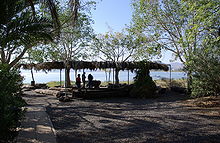- Dalmanutha
-
Dalmanutha (Griechisch δαλμανουθα) ist ein im neuen Testament erwähnter Ort am See Genezareth in Israel.
In Mk 8,10 EU schreibt Markus: "Und sogleich stieg er mit seinen Jüngern in das Schiff und kam in die Gegend von Dalmanutha." Dies geschah nach der "Speisung der Viertausend". Matthäus schreibt in Mt 15,39 EU nach der Speisung: "Und nachdem er die Volksmenge entlassen hatte, stieg er in das Schiff und kam in die Gegend von Magdala."
Deswegen vermuten Wissenschaftler, dass sich Dalmanutha auf den griechischen Wachturm [1]in der Nähe von Magdala, oder auch auf Magdala selber beziehen könnte. Andere vermuten, dass mit Dalmanutha das Ruinendorf El-Mejdel im Ain-el-Barideh Tal, etwa ein Kilometer von Magdala entfernt, gemeint ist. Wieder andere vermuten, das die Gegend um Magdala so genannt wurde.[2]
Außerhalb des Markus-Evangeliums wird dieser Ort in keiner Literatur erwähnt.
Einzelnachweise
- ↑ Dalmanutha — a place on the west of the Sea of Galilee, mentioned only in Mark 8:10. In the parallel passage it is said that Christ came "into the borders of Magdala" (Matt. 15:39). It is plain, then, that Dalmanutha was near Magdala, which was probably the Greek name of one of the many Migdols (i.e., watch-towers) on the western side of the lake of Gennesaret. It has been identified in the ruins of a village about a mile from Magdala, in the little open valley of 'Ain-el-Barideh, "the cold fountain," called el-Mejdel, possibly the "Migdal-el" of Josh. 19:38.
- ↑ Metzer in seiner Reisebeschreibung vom J. 1698 spricht von einer Stadt Magdala in der Landschaft Dalmanutha, Beschreibung von Palestina Seite 124
Literatur
- Beschreibung von Palestina, Herderschen Verlagsbuchhandlung , Freiburg und Karlsruhe 1830
- Mario Marina "Dalmanuta La Gloria di Dio" (Spanisch 1999) Marini "Dalmanutha The Glory of God" , Ares, Milan 2003
Weblinks
Kategorie:- Ort in der Bibel
Wikimedia Foundation.

